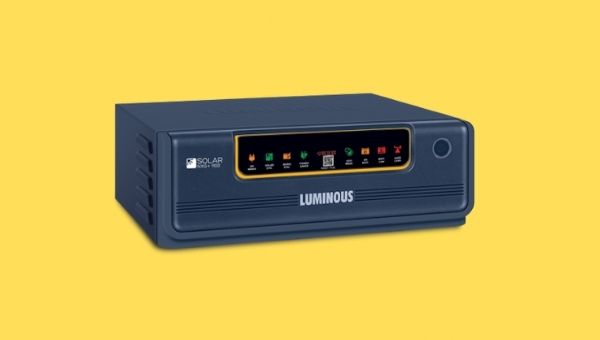
If you are planning to go solar but are confused about which solar inverter to buy, we will walk you through the process of choosing the right one.
But before we do that let us help you understand what is a solar inverter, how it works and types of solar inverters that are available in the market. Let’s get started.
What is a Solar Inverter?
You may have seen the normal home UPS inverter that provides the required power back up during a power outage. A solar inverter is quite similar, however, the only difference being that a solar inverter’s primary source of energy are the solar panels.
The solar inverter receives DC electricity from the solar panels which it converts into AC energy so that it can be used by the appliances and other electronics in your home.
How does Solar Inverter work?
During daytime when the sun shines on the solar panels installed on your properties the electrons inside the solar cells get activated and they start to move around thereby producing DC energy.
The DC energy is then transferred into the inverter that converts it into AC energy for powering home appliances.
Types of Solar Inverters
There are three main types of solar inverters.
- Grid Tied Inverters
- Off-Grid Inverters
- Hybrid Inverters
These inverters differ from each other in terms of whether or not they are connected to the local grid. For example, the grid tied inverter is connected to the local grid whereas the off-grid inverters have no connection with the local grid.
Whenever there’s a power deficit (because of the solar panels not generating enough power), the grid tied inverters draw the deficit energy from the local grid. Remember, the grid tied inverter systems do not have solar batteries.
On the other hand off-grid inverters are connected to solar batteries. So when the solar panels generate excess energy, it gets stored in the solar batteries for emergency usage (during times when solar panels are not generating the required amount of energy).
The third and most reliable inverter type is the hybrid inverter system. It is connected both to the local grid and to the solar batteries. Since a hybrid inverter can draw power from multiple sources it is far more reliable than both grid-tied and off-grid inverters.
Selecting the Right Solar Inverter Type
Well, your choice of solar inverter system should depend on the frequency and duration of power cuts in your area. Let’s consider a few scenarios.
Scenario 1 – There are rare or few power cuts in your area
If you live in an area where there’s rarely a power cut, you should go for a grid-tied inverter. Just make sure you buy the right number of solar panels that not only produce enough energy to power your home, but also produce surplus energy that can be transferred to the grid.
Reason being that during night time, or instances of shading, when solar panels don’t produce enough energy you will have to draw the deficit energy from your local grid.
And since you are already supplying surplus energy to the grid, the deficit energy drawn gets adjusted with it and helps you save on your energy bills.
Scenario 2 – There are frequent and long power cuts in your area
If you experience frequent and long power cuts in your area then it is advisable that you go for an off-grid inverter.
That’s because even if there are long and frequent power outages during a time when your solar panels aren’t generating enough energy, you will still have the solar batteries to rely on. The same is applicable if you live in a far-off area where there’s no local grid near you.
Final Thoughts
Like we mentioned earlier, if you want the most reliable inverter then you must go for a hybrid inverter that’s a combination of grid-tied and off grid inverter.
Also, if you have any questions or need any help, we recommend you to check with your friend who already use Solar inverter or consult a solar expert to help you with your concerns. Happy Shopping!
